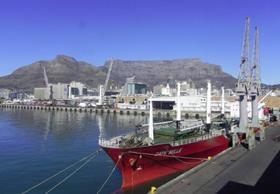
British prime minister Theresa May did more than pull out her dancing steps in Cape Town this week, when she made her first visit to South Africa as leader.
After she departed to visit African countries to the north, South African sources said they believed the visit had paved the way for future partnerships between the Western Cape and the UK.
May and her delegation met with president Cyril Ramaphosa in Cape Town on Tuesday (30 August), after which she addressed an investment summit in the city.
Afterwards the Western Cape’s minister of economic opportunities, Alan Winde, said the visit showed real potential for partnerships with the Western Cape.
For the region's fruit industry, where the lion's share of South African apples, pears, stonefruit and table grapes are grown, this brought hope of increased business as Britain prepares to leave the European Union. It will have soothed the nervous rising in the UK produce sector that a hard Brexit next year could bring some disruptions.
Prime minister May highlighted the economic potential that exists in Africa and pledged to boost investment on the continent saying: “From the Western Cape to the Mediterranean come stories of increasing stability, growth, innovation and hope.”
Minister Winde said the high-level business delegation comprised of businesses ranging from bio-tech to water purification, and many of the businesses were in line with the local government’s current challenges in the Western Cape. “I saw real potential for business to business opportunities,” he said.
“Prime minister May’s plans to boost investment on the continent to create jobs is exactly in line with what we are trying to achieve here in the Western Cape,' Winde continued. 'We also welcome the confirmation by prime minister May that the UK intends to carry over the European Union’s Economic Partnership Agreement with the Southern African Customs Union once the EU deal no longer applies to the UK.”
Members of the delegation also met with Western Cape government partners, Green Cape and Wesgro, to discuss the green economy and trade opportunities respectively.
Green Cape hosted Welsh secretary of state Alun Cairns, who emphasised that he was exploring trade opportunities in South Africa for Welsh companies. Two Welsh businesses, Hydro Industries and Sure Chill, were also part of the delegation visiting South Africa.
Green Cape CEO Mike Mulcahy said some of opportunities present and evolving within South Africa's which were discussed, included those in water, waste, energy and the agricultural sectors.
Wesgro CEO Tim Harris said his organisation fully supported the signing of the joint statement between the UK, Southern African Customs Union and Mozambique Economic Partnership Agreement to ensure continuity and strengthening of our trade relations.



